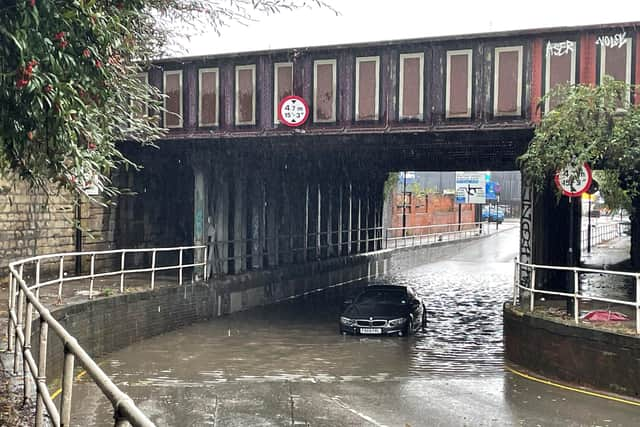Storm Babet: Seven things you must know if you've been hit by flooding
Insurers’ first priority when helping customers will be to make sure they recover as quickly as possible, according to the Association of British Insurers (ABI).
The storm brought more than one month’s worth of rain in the worst affected regions of the UK on Thursday.
Advertisement
Hide AdAdvertisement
Hide AdStorm Babet hit Ireland on Wednesday after sweeping in from the Atlantic, with swathes of Scotland, Northern Ireland and northern England seeing strong winds and heavy rain on Thursday.


ABI spokesman Malcolm Tarling said: “Insurers expect bad weather to strike at any time, and their first priority when it does is to help homeowners and businesses recover as soon as possible.
“Your insurer can make any emergency payments needed, arrange any temporary emergency accommodation, and organise necessary repairs. If you suffer damage to your property, contact your insurer as soon as you can for help and advice.”
Insurer Aviva said people should avoid moving through floodwater, which can be fast flowing and contaminated with sewage. It also cautioned households against trying to repair damage while a flood or storm is still in progress.
Advertisement
Hide AdAdvertisement
Hide AdHere is some general insurance advice from the ABI for those affected by flooding:
1. Contact your insurer as soon as possible. Most will have 24-hour emergency helplines to ensure you get advice on what to do and arrange repairs as quickly as is possible.
2. If necessary, arrange temporary emergency repairs to stop any damage getting worse, but speak to your insurer first.
3. If you have to arrange emergency repairs yourself, tell your insurer and keep any receipts, as this will form part of your claim.
Advertisement
Hide AdAdvertisement
Hide Ad4. Do not be in a rush to throw away damaged items, unless they are a danger to health, as these may be able to be repaired or restored. Your insurer will advise.
5. If your home is uninhabitable while repairs are being carried out, your insurer will arrange for, and pay the cost of, any alternative temporary accommodation you may need.
6. Commercial polices will cover damage to premises and stock. Business interruption cover (which may be included or purchased separately) will cover additional trading costs, such as hiring temporary alternative trading premises if necessary.
7. Comprehensive motor insurance covers the cost of repairing or replacing vehicles damaged by flooding. But do follow any travel advice, and if necessary, only travel if you really need to.
Advertisement
Hide AdAdvertisement
Hide AdHeavy rain and strong winds from Storm Babet continued to cause major transport disruption yesterday. In Scotland, several major road sections and rail routes were closed, while air passengers are being hit by flight cancellations.
Last month, an index revealed that the average quoted price of home insurance has surged by around a quarter (25.7 per cent) annually.
Data analytics firm Consumer Intelligence, which compiled the report, said this is the biggest jump it has seen in records going back to 2014.
The average premium quoted for a buildings and contents policy was £212 in July, it found, up from £168 in July 2022. The figures have been rounded off.
Advertisement
Hide AdAdvertisement
Hide AdA spokesperson for the Association of British Insurers (ABI) said last month: “Insurers appreciate these continue to be tough times for many households coping with the rising cost of living and continue to do all they can to keep premiums as competitive as possible.
“Last year’s extreme weather and the surge in subsidence claims was a dramatic reminder of the importance of insurance, and insurers paid out £2.9 billion to help customers cope with unexpected events, such as storm damage.”
The spokesperson added: “If you’re worried about being able to afford your home insurance, speak to your insurer about any alternative payment options that may be available.”